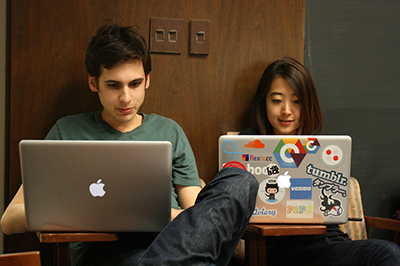Studying for your SATs is smart. Taking AP classes is awesome. Making the honor roll is … well honorable. But there are lots of other ways you can prepare for college while you’re still in high school that feel more like fun than prep work. We interviewed five high school students who have participated in interesting meaningful and/or adventurous programs to beef up their college applications and life experience—not to mention their “What I Did On My Summer Vacation” essays!
IAN FARRELL Grade: 10
HIGH SCHOOL: The Colorado Springs School
Colorado Springs CO
INTENDED MAJOR: Law and creative writing
Ian likes mixing things up and has already participated in several special programs. Each year his high school the Colorado Springs School offers two-week Experienced-Centered Seminars (ECS). In eighth grade he participated in a winter survival program where they made snow caves—and slept in them! In ninth grade he chose a trip to Vancouver to study Native American art and culture and this year he was in the Iron Chef program where he learned gourmet cooking. “The best part of the Vancouver ECS was getting to make drums with native teachers” says Ian. “They also cooked salmon for us in the native way and we all ate together.”
Ian also likes to joke about how he gained independence. “I got left behind at the hotel one morning. I told the teacher I forgot something in my room and he told me to go back for it. Then he forgot all about me and took the class away! I knew where they were going and walked a few miles across the city to catch up.”
This past summer Ian attended the Center for Bright Kids Luminary Project at the Colorado School of Mines. It’s a three-week program in July and the students stay in the dorms. Under the program students focus on one intensive course of study for 6.5 hours a day—the equivalent of one full year of honors-level high school content or one semester of college content. But again it’s not all work and no play! The Luminary Project boasts “As much as students think hard in the accelerated courses they [also] play hard in this deepened residential experience.”
LACEY MAGEE Grade: 11
HIGH SCHOOL: Academy of Allied Health and Science
Neptune NJ
INTENDED MAJOR: Premed and linguistics
Lacey Magee likes to stay busy. The summer before eleventh grade she volunteered at Jersey Shore University Medical Center to get a glimpse of the medical field which she plans to enter after college possibly to be a pediatric cardiologist. Although she did sometimes have to file paperwork she also got some first-hand knowledge. “I got to meet doctors and nurses from all different fields talk to and assist patients and even watch surgeries and autopsies!,” she says.
During the school year she volunteered at another medical facility CentraState once a week and the Juvenile Conference Committee (JCC) program once a month. “JCC is a program that acts as a reprieve for juvenile delinquents,” explains Lacey “where the juvenile comes before a committee and has the option to follow through with JCC recommendations versus going to actual court and having their crime on their permanent record.” Lacey says that the best part of JCC was learning about the field of criminal justice and law and finally understanding the types of hard choices and decisions a juror must make. But there was also a downside. “The most challenging part of JCC was when the delinquents coming in were people I used to know old friends who go to different schools. I had to make the decision either to listen to their case or excuse myself from the case and hope they don’t look at me differently from now on.”
As for what she learned from the programs Lacey has this to say: “I learned how to suture take blood pressures and pulses and make casts slings and tourniquets. Additionally I learned how to open up and talk with doctors and ask questions. In JCC I really learned about the horrible consequences of making bad decisions.. I also gained a large vocabulary of law-related words and understand the jargon more.”
DUNCAN WOOD Grade: 11
HIGH SCHOOL: The Gatton Academy of Mathematics and Science in Kentucky
Bowling Green KY
INTENDED MAJOR: Considering a major in physics engineering mathematics music performance French or video production
For his junior and senior year of high school Duncan is attending The Gatton Academy of Mathematics and Science in Kentucky at Western Kentucky University. It’s a public residential program that allows high school students to graduate with more than 60 hours of college credit. And did we mention that tuition housing and meals are free?
Duncan says that his biggest challenges were establishing a solid work ethic system and managing his time. The best part? “Having the independence to take whatever courses I want whether it’s upper-level physics or symphonic band. Just throwing me into the fray and letting me handle my own collegiate workload allowed me to find out what works and what doesn’t when participating in university classes. [And] I learned to manage my time and form meaningful relationships with professors.”
And although Duncan admits to studying theoretical physics mathematics and computer science on his own at home he’s a pretty normal guy. “Generally I go to class decompress work on homework and goof around with my peers,” he says. “In that order.”
VALERIE BELL Grade: 11
HIGH SCHOOL: Archbishop Wood High School
Warminster PA
INTENDED MAJOR: Journalism and communications
Valerie is pretty sure what she wants to study in college. In July 2010 she attended the 13-day National Student Leadership Conference (NSLC) on journalism and mass communications in Washington D.C. Although there was a rigorous schedule (a typical day was filled with at least one field trip and a class on journalism) Valerie enjoyed speaking with professional journalists and interacting with students from all over the world. “I learned about the importance of the newspaper in our society … the possible death of newspapers and that while newspapers may die the common need for news is insatiable. I also learned about the growth of online journalism and about how social networking websites are affecting news outlets.”
Valerie says the NSLC program also taught her about independence and gave her “a real feel for how a college class is conducted.”
In addition to inspiring her to become a great journalist Valerie says through the leadership workshops and other group activities she learned about all of the components that make up a great leader. “During the conference speakers talked about … the leaders that we have thanks to the rise of pop culture. For example Katy Perry and Lady Gaga can both be … acknowledged as leaders due to their influence on our society. I learned about the skills necessary to become a leader such as the necessity of story pitching and the power of persuasion.”
This past summer Valerie attended the Washington Journalism and Media Conference at George Mason University near Washington D.C. It’s a natural continuation of her current work writing a “reality” section for the local paper.
RICHELLE ROELANDT LU HOMO GRADE: 12
HIGH SCHOOL: Rancho Cucamonga High School
Rancho Cucamonga CA
INTENDED MAJOR: Biochemistry
Richelle spent three years of high school volunteering with the Sacred Heart Catholic Church religious education program for children with special needs and disabilities. “The best part of the program was being able to witness each child improve and learn something new about friendship and love each week,” says Richelle who attended October through May each year. “It’s the best thing in the world when a child with Down syndrome or autism recites a verse or sings a song that was taught for months.”
Richelle says that when teaching a child with disabilities you must be more patient and creative with the methods of instruction. “In addition being personable amicable and sociable are [important],” she says. “[You] must be able to communicate with these students’ parents and assure them that their children have the ability to learn—though much slower—like other students. These are attributes I will forever carry with me to college as I will need the patience to learn the creativity to research and the sociability to meet new friends.”
Remember preparing for college doesn’t have to be dull! Sure a summer program or volunteering can look good on your application but your main objective should be to enjoy the experience not add another notch to your credentials belt. If your school doesn’t offer anything a quick Internet search of programs in your area should give you some good options. Be sure to check out our brief on “Finding the Right Pre-College Program” on page 28.
Ben Michaels is a freelance writer from Vermont.



